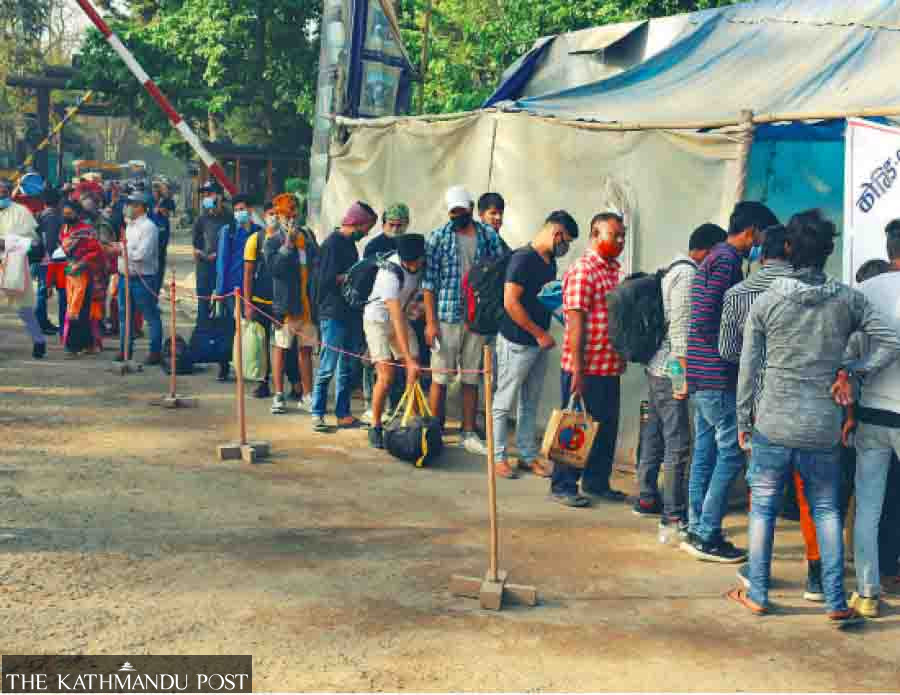Health
New Covid surge in India a cause for concern in Nepal
As more Nepalis are expected to return home from India to vote in the elections, this will increase the risk of Covid spread in communities, experts say.
Arjun Poudel
New cases of Covid-19 have started surging in several states of India including in New Delhi.
The reports of a surge in cases in India do not bode well for Nepal which shares a long open border with its southern neighbour. As the earlier iterations of the pandemic have shown, the crest and trough of the Covid-19 pandemic in Nepal have been directly proportional to those in India.
Experts in Nepal said that the rise in new cases in India is a matter of concern since there is an uninterrupted cross-border movement every day. Also, the number of people returning home is set to increase in the coming days in light of the upcoming local elections.
The daily Covid-19 cases in New Delhi, the capital of India, is on the rise over the last few days. The positivity rate has jumped from 0.5 percent to 2.7 percent in a week, according to a media report.
Delhi recorded 517 fresh cases of Covid-19 in 24 hours on Sunday.
“Although the actual cause of the surge in new cases in some states of India is not known yet, a new variant might be responsible for it,” said Dr Sher Bahadur Pun, the chief of the Clinical Research Unit at Sukraraj Tropical and Infectious Disease Hospital. “If so, past experiences tell us that cases will start spiking in Nepal too after two weeks.”
India registered 2,183 new infections on Monday, a 90 percent jump in the last 24 hours according to the Union Health Ministry of India. The Indian state of Uttar Pradesh adjoining Nepal and the western state of Haryana are also witnessing a surge in new cases.
Several preventive measures including mandatory face masks have been enforced by the authorities concerned in these two states.
The preparations for local elections in Nepal are already in full swing with political parties busying themselves with candidate selection and campaigning, among other things. This could further push Covid-19 cases in the country, experts fear.
“Political rallies, assemblies and meetings will increase further in coming days, which will only help the spread of the infection in communities,” said Dr Janak Koirala, an infectious disease expert. “As the election is approaching, authorities must enforce some public health measures to prevent the spread of infection. People should also be wary of Covid-19 and remember that the risk of the resurgence of the virus has not lessened.”
Several doctors the Post talked to said that a new surge of infection is inevitable in Nepal if India experiences a surge. Although it is too early to predict a situation like the second wave last year where the Delta variant wreaked havoc, the possibility of the next wave surge of the Omicron variant is possible, they said.
“We can expect a wave pushed by an Omicron-like variant, probably the XE variant,” said Pun, of the Sukraraj Hospital.
‘Omicron XE’, a new recombinant coronavirus variant, is the result of two Omicron strains—BA.1 and BA.2.
“And there is every chance that the virus will spread throughout the country at once, as people returning from India to vote reach their villages,” said Pun.
In the second wave of the pandemic, driven by the Delta variant, which started in April last year, over 8,000 people died of the infection. Hundreds of thousands are estimated to have died in India in the second wave that started in March last year.
The World Health Organisation estimates that the actual number of deaths from Covid-19 in India is at least four times the official figures, which currently stand at 521,101. It is reported that the UN health body is set to release its estimates of excess deaths caused by Covid-19 this month.
In Nepal, 11,951 deaths have been reported from Covid-19 so far according to the official count. But experts attribute more deaths to Covid-19 since not every death has gone into the government record.
When the number of cases started declining, the measures enforced to screen the Covid-19 cases were pulled back. Quarantine or isolation facilities went out of operation; collection and testing of swab samples of suspects declined several folds. There are no precautionary measures to screen people returning from India for Covid-19 letting them make their way home directly untested and undetected.
Life has returned to normal in Nepal with most people shunning even the basic Covid-19 safety measures such as wearing face masks, maintaining social distance and washing hands.
Experts warn that it will be irresponsible of the authorities and the public to wait until the last minute to adopt safety measures. The new variant still carries a huge risk for the elderly population and those with comorbidities.
“We should not take risks,” said Dr Biraj Karmacharya, an epidemiologist. “Authorities concerned should focus on vaccination and keep enforcing safety measures.”
The Ministry of Health and Population said that it is aware of the surge in new cases in India and has already alerted the agencies concerned to step up surveillance. “We have also asked them to increase swab collection from border points,” said Dr Samir Kumar Adhikari, joint spokesperson for the Health Ministry.




 15.12°C Kathmandu
15.12°C Kathmandu














